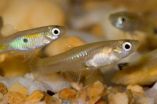(Press-News.org) PITTSBURGH—An analysis of plant and petroleum-derived plastics by University of Pittsburgh researchers suggests that biopolymers are not necessarily better for the environment than their petroleum-based relatives, according to a report in Environmental Science & Technology. The Pitt team found that while biopolymers are the more eco-friendly material, traditional plastics can be less environmentally taxing to produce.
Biopolymers trumped the other plastics for biodegradability, low toxicity, and use of renewable resources. Nonetheless, the farming and chemical processing needed to produce them can devour energy and dump fertilizers and pesticides into the environment, wrote lead author Michaelangelo Tabone (ENG, A&S '10), who conducted the analysis as an undergraduate student in the lab of Amy Landis, a professor of civil and environmental engineering in Pitt's Swanson School of Engineering. Tabone and Landis worked with James Cregg, an undergraduate chemistry student in Pitt's School of Arts and Sciences; and Eric Beckman, codirector of Pitt's Mascaro Center for Sustainable Innovation and the George M. Bevier Professor of Chemical and Petroleum Engineering in Pitt's Swanson School. The project was supported by the National Science Foundation.
The researchers examined 12 plastics—seven petroleum-based polymers, four biopolymers, and one hybrid. The team first performed a life-cycle assessment (LCA) on each polymer's preproduction stage to gauge the environmental and health effects of the energy, raw materials, and chemicals used to create one ounce of plastic pellets. They then checked each plastic in its finished form against principles of green design, including biodegradability, energy efficiency, wastefulness, and toxicity.
Biopolymers were among the more prolific polluters on the path to production, the LCA revealed. The team attributed this to agricultural fertilizers and pesticides, extensive land use for farming, and the intense chemical processing needed to convert plants into plastic. All four biopolymers were the largest contributors to ozone depletion. The two tested forms of sugar-derived polymer—standard polylactic acid (PLA-G) and the type manufactured by Minnesota-based NatureWorks (PLA-NW), the most common sugar-based plastic in the United States—exhibited the maximum contribution to eutrophication, which occurs when overfertilized bodies of water can no longer support life. One type of the corn-based polyhydroyalkanoate, PHA-G, topped the acidification category. In addition, biopolymers exceeded most of the petroleum-based polymers for ecotoxicity and carcinogen emissions.
Once in use, however, biopolymers bested traditional polymers for ecofriendliness. For example, the sugar-based plastic from NatureWorks jumped from the sixth position under the LCA to become the material most in keeping with the standards of green design. On the other hand, the ubiquitous plastic polypropylene (PP)—widely used in packaging—was the cleanest polymer to produce, but sank to ninth place as a sustainable material.
Interestingly, the researchers found that the petroleum-plant hybrid biopolyethylene terephthalate, or B-PET, combines the ills of agriculture with the structural stubbornness of standard plastic to be harmful to produce (12th) and use (8th).
Landis is continuing the project by subjecting the polymers to a full LCA, which will also examine the materials' environmental impact throughout their use and eventual disposal.
INFORMATION:
Pitt researchers: Plant-based plastics not necessarily greener than oil-based relatives
Biopolymers are the more eco-friendly material, but farming and energy-intense chemical processing means they are dirtier to produce than petroleum-derived plastics, according to study in Environmental Science & Technology
2010-10-22
ELSE PRESS RELEASES FROM THIS DATE:
Smaller is better in the viscous zone
2010-10-22
DURHAM, N.C. -- Being the right size and existing in the limbo between a solid and a liquid state appear to be the secrets to improving the efficiency of chemical catalysts that can create better nanoparticles or more efficient energy sources.
When matter is in this transitional state, a catalyst can achieve its utmost potential with the right combination of catalyst particle size and temperature, according to a pair of Duke University researchers. A catalyst is an agent or chemical that facilitates a chemical reaction. It is estimated that more than 90 percent of chemical ...
Carnegie Mellon researchers break speed barrier in solving important class of linear systems
2010-10-22
PITTSBURGH—Computer scientists at Carnegie Mellon University have devised an innovative and elegantly concise algorithm that can efficiently solve systems of linear equations that are critical to such important computer applications as image processing, logistics and scheduling problems, and recommendation systems.
The theoretical breakthrough by Professor Gary Miller, Systems Scientist Ioannis Koutis and Ph.D. student Richard Peng, all of Carnegie Mellon's Computer Science Department, has enormous practical potential. Linear systems are widely used to model real-world ...
Light on silicon better than copper?
2010-10-22
DURHAM, N.C. -- Step aside copper and make way for a better carrier of information -- light.
As good as the metal has been in zipping information from one circuit to another on silicon inside computers and other electronic devices, optical signals can carry much more, according to Duke University electrical engineers. So the engineers have designed and demonstrated microscopically small lasers integrated with thin film-light guides on silicon that could replace the copper in a host of electronic products.
The structures on silicon not only contain tiny light-emitting ...
Too many sisters affect male sexuality
2010-10-22
Growing up with lots of sisters makes a man less sexy. For rats, anyway. A new study published in Psychological Science, a journal of the Association for Psychological Science, finds that the sex ratio of a male rat's family when he's growing up influences both his own sexual behavior and how female rats respond to him.
David Crews, a psychobiologist at the University of Texas at Austin, is interested in how early life affects behavior later. This is an area that has received a lot of attention recently, such as research showing that the position of a fetus in the uterus ...
Strategies for translational research in the UK
2010-10-22
A commentary published in the journal, Science Translational Medicine, examines the structures of translational research investment in the UK.
The commentary has been written by researchers from the National Institute for Health Research (NIHR) comprehensive Biomedical Research Centre (BRC) at Guy's and St Thomas' and King's College London. The authors consider the results of substantial Government and charitable investment in translational research taking place within the NHS.
The commentary follows the progress of the research and development funding streams available ...
Poor start in life need not spell doom in adulthood
2010-10-22
RIVERSIDE, Calif. – Does the environment encountered early in life have permanent and predictable long-term effects in adulthood? Such effects have been reported in numerous organisms, including humans.
But now a biology graduate student at the University of California, Riverside reports that how individuals fare as adults is not simply a passive consequence of the limits that early conditions may impose on them. Studying how adult Trinidadian guppies (small freshwater fish) responded to their early food conditions, Sonya Auer found that the guppies had compensated ...
Researchers find better method to help mothers cope with child's cancer and related stress
2010-10-22
VIDEO:
Martha Askins explains problem-solving skills training.
Click here for more information.
BOSTON - Mothers who have children diagnosed with cancer now have a better approach to address and cope with stresses associated with their child's disease.
A new certified intervention has proven to be more effective long term compared to other psychological methods, as reported today at the 42nd Congress of the International Society of Pediatric Oncology.
In a joint ...
Study finds airbags reduce risk of kidney injury in car crashes
2010-10-22
CHICAGO (October 21, 2010) – Occupants in motor vehicles with airbags are much less likely to suffer kidney or renal damage in a crash than are occupants in vehicles without airbags, according to a new study in the September Journal of the American College of Surgeons.
Little is known about how to prevent or reduce injury to solid organs from motor vehicle collisions. In fact, this study is the first to evaluate the protective effect of airbags on a specific organ system – in this case, the kidney and other renal, or upper urinary tract, organs.
The researchers found ...
Telementoring may address need for surgical subspecialty expertise in remote locations
2010-10-22
CHICAGO (October 21, 2010) – Telementoring may be an effective way for subspecialist surgeons to assist remotely located general surgeons in the care of patients in need of emergency subspecialty surgical procedures, according to new research findings published in the September issue of the Journal of the American College of Surgeons.
In the study, eight general surgery residents with no formal subspecialty training participated in three mock operations using animal cadavers intended to simulate live procedures. When telementored, the residents achieved higher overall ...
Studies show everolimus-eluting stent implantation reduces restenosis and repeat revasculariztion
2010-10-22
Two new studies have determined that everolimus-eluting stent (EES) implantation reduced the incidence of restenosis and repeat revascularization in patients with calcified culprit lesions, and had fewer clinical events. Results show the rate of major cardiac adverse events in EES-treated patients with calcified lesions were higher than in those for noncalcified lesions, but remained lower than the results of previously reported stent studies. Details of both studies are published in the November issue of Catheterization and Cardiovascular Intervention, a peer-reviewed ...
LAST 30 PRESS RELEASES:
Scientists show how to predict world’s deadly scorpion hotspots
ASU researchers to lead AAAS panel on water insecurity in the United States
ASU professor Anne Stone to present at AAAS Conference in Phoenix on ancient origins of modern disease
Proposals for exploring viruses and skin as the next experimental quantum frontiers share US$30,000 science award
ASU researchers showcase scalable tech solutions for older adults living alone with cognitive decline at AAAS 2026
Scientists identify smooth regional trends in fruit fly survival strategies
Antipathy toward snakes? Your parents likely talked you into that at an early age
Sylvester Cancer Tip Sheet for Feb. 2026
Online exposure to medical misinformation concentrated among older adults
Telehealth improves access to genetic services for adult survivors of childhood cancers
Outdated mortality benchmarks risk missing early signs of famine and delay recognizing mass starvation
Newly discovered bacterium converts carbon dioxide into chemicals using electricity
Flipping and reversing mini-proteins could improve disease treatment
Scientists reveal major hidden source of atmospheric nitrogen pollution in fragile lake basin
Biochar emerges as a powerful tool for soil carbon neutrality and climate mitigation
Tiny cell messengers show big promise for safer protein and gene delivery
AMS releases statement regarding the decision to rescind EPA’s 2009 Endangerment Finding
Parents’ alcohol and drug use influences their children’s consumption, research shows
Modular assembly of chiral nitrogen-bridged rings achieved by palladium-catalyzed diastereoselective and enantioselective cascade cyclization reactions
Promoting civic engagement
AMS Science Preview: Hurricane slowdown, school snow days
Deforestation in the Amazon raises the surface temperature by 3 °C during the dry season
Model more accurately maps the impact of frost on corn crops
How did humans develop sharp vision? Lab-grown retinas show likely answer
Sour grapes? Taste, experience of sour foods depends on individual consumer
At AAAS, professor Krystal Tsosie argues the future of science must be Indigenous-led
From the lab to the living room: Decoding Parkinson’s patients movements in the real world
Research advances in porous materials, as highlighted in the 2025 Nobel Prize in Chemistry
Sally C. Morton, executive vice president of ASU Knowledge Enterprise, presents a bold and practical framework for moving research from discovery to real-world impact
Biochemical parameters in patients with diabetic nephropathy versus individuals with diabetes alone, non-diabetic nephropathy, and healthy controls
[Press-News.org] Pitt researchers: Plant-based plastics not necessarily greener than oil-based relativesBiopolymers are the more eco-friendly material, but farming and energy-intense chemical processing means they are dirtier to produce than petroleum-derived plastics, according to study in Environmental Science & Technology



